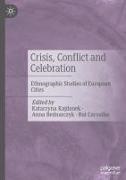Share
Fr. 178.00
Anna Bednarczyk, Rui Carvalho, Katarzyna Kajdanek
Crisis, Conflict and Celebration - Ethnographic Studies of European Cities
English · Hardback
Shipping usually within 2 to 3 weeks (title will be printed to order)
Description
This book illuminates how the profound challenges faced by contemporary societies over the past few decades, encompassing climate change and other environmental risks, global health threats, warfare, and mass migration, manifest themselves in European cities. The chapters bring cutting-edge ethnographic studies which address these complex issues through three key conceptual dimensions of urban life: crisis, conflict, and celebration.
The concept of crisis is critically explored in its various economic, political and cultural dimensions affecting urban residents in multiple social and spatial aspects of their lives. Crises often lead to conflicts, dynamic processes that give rise to interest groups and complex social landscapes of resistance. By examining conflicts in urban contexts, the book uncovers the power dynamics and vulnerabilities emerging during turbulent times. Crises and conflicts also present opportunities for urban transformation and regeneration, bringing underlying beliefs and norms into question, paving the way for new social dynamics within urban environments. These conflictual spaces can therefore become arenas for celebration of urbanity, where communities express resilience, cultural identity, and collective solidarity.
As well as providing new insights into the present and future of European cities and the pivotal role of urban areas as centers of social change, contestation, and community-building, the book provides an important methodological contribution through innovative qualitative research in a diverse range of European urban areas.
List of contents
Chapter 1. Crisis, Conflict and Celebration in European Cities. An Introduction (Katarzyna Kajdanek, Anna Bednarczyk, Rui Carvalho).- Part I: The Urbanisation Of Contemporary Global Crises: Military, Pandemic, Environmental.- Chapter 2. Mitigating Displaced Place Identities in Ukrainian Wartime Art (Oleksandra Nenko).-Chapter 3. The taxi driver and the city. (Post)pandemic navigations of Lisbon, an ethnography of the night appropriation (Guilherme Costa, Manuel Garcia-Ruiz).-Chapter 4. Food Question in Planning: Perspectives from Two Turkish Metropolis (Zeynep Özçam, Sila Özkavaf Senalp).- Chapter 5. Sites of Culture of Regeneration - Curating Regenerative Practices and Relations with City Sewage and Soil in Wroclaw, Poland (Jakub Pawlak, Katarzyna Krzeminska).- Chapter 6. Green is the new "smart". Global Cities, data driven sustainability and the metrics of 'climate urbanism (Sabine Barthold).- Part II: The Conflictual Nature Of Urban Governance: Politics, Activists, And Organisations.- Chapter 7. A city of water: Mantua lakes through the lens of socio-spatial relations (Caterina Bracchi; Francesco Galli, Giorgio Osti).- Chapter 8. Landscapes of hope and emancipation: community care practices, gender and welfare transformations in Southern European context (Pinelopi Vergou).- Chapter 9. Urban reviewers and the non-post-socialist municipalism in Poland and pre-2022 Ukraine (Lukasz Drozda).- Chapter 10. Emotions and Islandness: Exploring Interactions of Urban Activist Communities in the Prince Islands of Istanbul (Yasemin Bahçekapili, Yalçintan Murat Cemal).- Chapter 11. The Spatial Social and Experiential Dimension of Sharing: An Urban Experiment of Participatory Urbanism in Spain (Rossana Galdini, Silvia De Nardis).- Part III: Celebrating Urban Diversity And Communities: Social Innovation And Urban Lived Experiences.- Chapter 12. Invisible spaces of resistance: performing the ordinary at Bilbao's Aste Nagusia(Le-Lina Kettner).- Chapter 13. Everyday Hybrid Inclusions in Le Lignon: Ethnography of Newcomers' Experience Over Time (Nerea Viana Alzola).-Chapter 14. Framing the Riviera: touristic performances and photography in contemporary Cascais, Portugal (Eduardo Silva, Lígia Ferro).- Chapter 15. The new flâneries in the urban space: from individualization to collective participation. A transdisciplinary approach (Giampaolo Nuvolati, Lucia Quaquarelli).- Chapter 16. Social innovation hubs: experiences of incubators as promoters of territorial development and urban regeneration (Mario Coscarello).
About the author
Katarzyna Kajdanek is an urban sociologist and associate professor at the Department of Urban and Rural Sociology, University of Wroc¿aw, Poland.¿
Anna Bednarczyk is a sociologist and a PhD candidate at the Graduate School for Social Research, Institute of Philosophy and Sociology of the Polish Academy of Sciences, Poland.
Rui Carvalho is a geographer and sociologist, and doctoral candidate in Sociology at Brown University, United States.
Product details
| Assisted by | Anna Bednarczyk (Editor), Rui Carvalho (Editor), Katarzyna Kajdanek (Editor) |
| Publisher | Springer, Berlin |
| Languages | English |
| Product format | Hardback |
| Released | 04.02.2025 |
| EAN | 9789819797189 |
| ISBN | 978-981-9797-18-9 |
| No. of pages | 419 |
| Illustrations | XXIV, 419 p. 19 illus., 17 illus. in color. |
| Subject |
Natural sciences, medicine, IT, technology
> Geosciences
> Geography
|
Customer reviews
No reviews have been written for this item yet. Write the first review and be helpful to other users when they decide on a purchase.
Write a review
Thumbs up or thumbs down? Write your own review.

